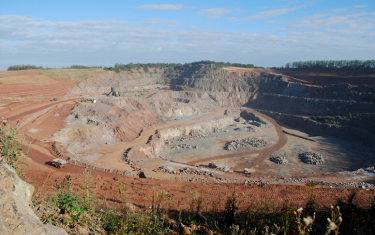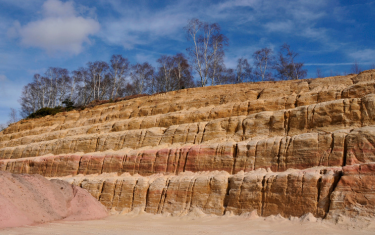Dr Alan Thompson, MRTPI, is a Minerals Planning and Geology Consultant
So, you’ve decided to go into planning, or perhaps you’re already there. Maybe you’re looking at jobs in a local authority, or perhaps (like me) you are more interested in a consultancy career in the private sector. Either way, there are lots of different areas in which to specialise, so…
What’s so special about minerals planning?
 Minerals planning is DIFFERENT! In contrast to most other forms of planning, it is a process of continuous development: Once planning permission has been granted for mineral extraction, that is just the start of the process. The development has to be monitored throughout the life of the permission to ensure that planning conditions are properly implemented, so that potential adverse impacts are adequately controlled, and that the site is restored on completion to an acceptable and beneficial after-use.
Minerals planning is DIFFERENT! In contrast to most other forms of planning, it is a process of continuous development: Once planning permission has been granted for mineral extraction, that is just the start of the process. The development has to be monitored throughout the life of the permission to ensure that planning conditions are properly implemented, so that potential adverse impacts are adequately controlled, and that the site is restored on completion to an acceptable and beneficial after-use.
And therein lies another important difference: mineral extraction is regarded as a 'temporary land use'. This is why, for example, it is perfectly valid for planning permission for a new quarry to be granted within the Green Belt. Quarrying activity inevitably changes the landscape however, especially in the case of large, hard rock quarries, where 'temporary' is often measured in decades, rather than years! Large numbers of conditions therefore have to be agreed to ensure that potential impacts on the landscape, environment and amenity are kept to a minimum and that benefits (e.g. from restoration and Biodiversity Net Gain) are optimised.

But recognition must also be given to the fact that minerals can only be worked where they are found, and that mineral extraction is essential to support a growing economy.
If you are considering moving into minerals planning some knowledge of geology or at least an understanding of where important mineral deposits in the country are found will be important. You will also need to learn about the essential nature of mineral extraction and how minerals are relied on by so many different aspects of modern life, and by virtually all other forms of new development. A good starting point for this will be to read the UK Minerals Strategy 2022 produced by industry and the new Critical Minerals Strategy, produced by the Government to underpin building. Much of this knowledge described here can be gained from the upcoming Introduction to Minerals Planning CPD Masterclass which is exactly what it says on the tin: an introduction that will help you to find out what is so special about minerals planning. By the end of this masterclass you will be able to understand:
- why we need minerals to grow the economy
- Where to find the various type of minerals
- How to minimise or avoid the potential adverse impacts of extracting minerals
- the importance and feasibility of beneficial land restoration
- Why we need monitoring and enforcement throughout the life of a quarry
After the self-guided learning part of this masterclass you will be invited to the live interactive webinar. Here you will have the opportunity to discuss your questions directly about this branch of the planning profession with a highly experienced minerals planning and geology consultant and see whether this unique and exciting career is for you?
As you’ll learn on the training course, it is all a Question of Balance!
Online CPD Masterclass: Introduction to Minerals Planning led by Dr Alan Thompson is available to book.
Please check the CPD Training Calendar for the next available date.
An online CPD Masterclasses contributes 6-7 CPD hours to your professional development (depending on the type).


